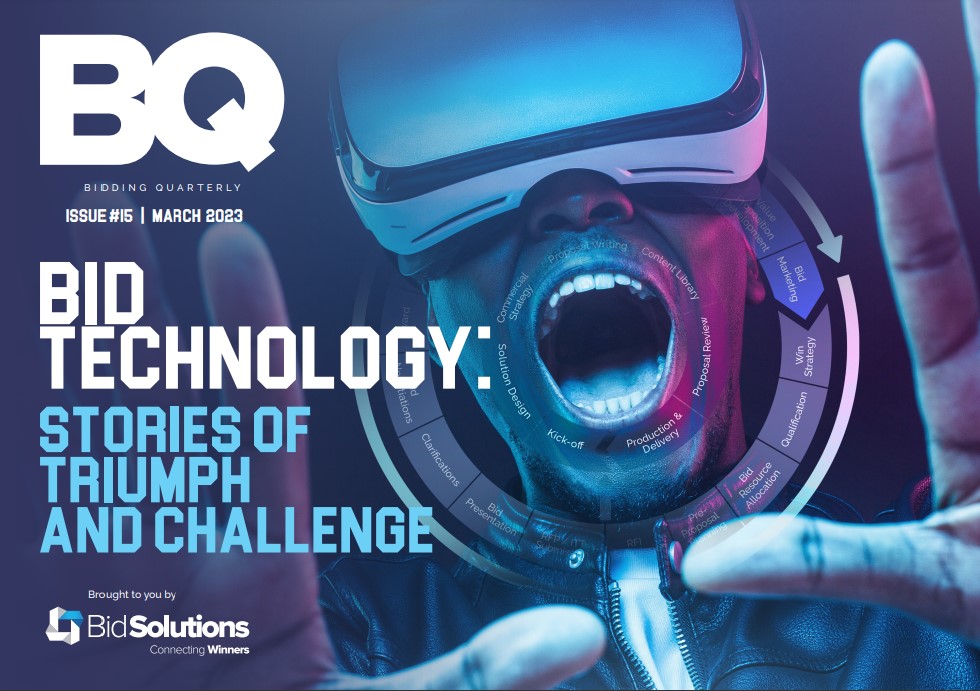
This article presents how AI-powered tools can help bidding from two perspectives – the professionals and the business leaders – and across three timelines: today, in three years, and in a decade.
Some context
First, a much-needed clarification: artificial intelligence is just software, a tool. The results look like magic because many never thought computers capable of performing this function. But if you look behind the magic, it’s just software and maths.
So no entity is trying to take over the world. Good.
Second, AI is a large domain with one huge game changer for bidding and proposals: the AI Large Language Models (LLMs from now on).
Why are AI LLMs such a big deal?
At its core, bidding is about three fundamental things: analysing RFPs, managing bid preparation, and writing responses. With LLMs, computers are now able to do three fundamental things: understand*, parse (extract, convert, move), and write complex bodies of text.
LLMs’ capabilities to support tender analysis (understand), manage proposals (parse), and draft responses (write) allows you to unlock huge business value across the bidding process.
* Let’s not enter the ethical debate of what “understand” means; let’s just accept LLMs can get the syntax and act on it coherently with language rules.
What’s in it for the professionals today?
User-friendly, generic LLMs can save us time in our day-to-day tasks. Examples include simplifying text, working with acronyms, extracting and organising text data, drafting outlines quickly, changing text styles, writing bios from resumes, and much more. These can save you massive time, and I personally recommend any peer to play with these and find their use cases.
There is one disclaimer: make sure you read and understand what happens with the information you prompt, no matter which LLMs you decide to use. As of today, March 2023, I don’t know any generic LLMs where you can safely input confidential or proprietary information.
What’s in it for businesses today?
Generic LLMs won’t cut it for your business, but niche solutions powered by this technology are already providing value to bidding teams.
Custom solutions powered by AI LLMs can give you a competitive edge by enhancing your processes for screening tenders, supporting bid/no-bid decisions (red flags, competitors’ influence) and building proposal management assets from RFPs (e.g., automatic compliance matrices), getting response drafts quickly, etc.
Tech vendors are figuring out how to apply this technology effectively in bidding, considering all the intellectual property, confidentiality, and cybersecurity issues involved. There are a few that already have. If you would like more information about LLM use cases for both professionals and businesses, I’ve compiled data you can access for free by joining my newsletter. Please see my bio for details.
Now let’s discuss some educated guesses about the future.
In the next three years
Given how expensive it is to build, train and serve these powerful AI LLMs, we may see only a few big ones run by the big tech names you are familiar with. There are some startups working with their own models, which has a point for some niche use cases (maybe even bidding). However, the inherent technical challenges in development may prevent this from being the norm.
It seems much more likely that, on top of these big powerful models, a middle layer of companies will unlock business opportunities by finetuning and developing tools serving specific markets and use cases. This means we’ll likely have AI-powered tools specially designed and optimised to help us review RFPs and manage and write proposals – but it doesn’t end here.
Since LLMs can be trained on specific bodies of knowledge – including your past proposals, sales reports, SMEs inputs, RFPs, and so on – we may see tech tools as specific as you can imagine. Tools trained to manage and write proposals in your market, industry, offering, or even for your usual client, fed from your corporate knowledge.
The results from these tools may make generic LLMs look like aficionado toys.
In a decade
Let’s be honest. This AI wave is moving so fast that nobody really knows where it will be in ten years – but here is my guess.
The same branch of AI is powering solutions on both sides of the RFP-Proposal process – buying and selling – so this technology could change procurement as we know it. It’s not unfeasible to imagine new standards that will automatically specify and comply with requirements, or power procurement computers communicating with vendor’s bidding servers to extract and process certain information.
In such a world, what makes you a good proposal professional or team would change drastically. Bidding could become a function where the actual bid preparation is all about having the right data, insights, tools, and making the right strategic decisions without much effort.
But decision making may be the last frontier. It involves much more than just technical capabilities and won’t be just about tech and positive business cases.
This article was written by Javier Escartin.
Javier is an aerospace engineer who has climbed the corporate ladder from engineering to business development. He is a fulltime freelance Proposal Manager and has recently launched a business to make our work easier with artificial intelligence. He is the founder of DeepRFP.com, runs the proposals newsletter jescartin.com, and manages proposals for worldwide technology companies as a consultant.

